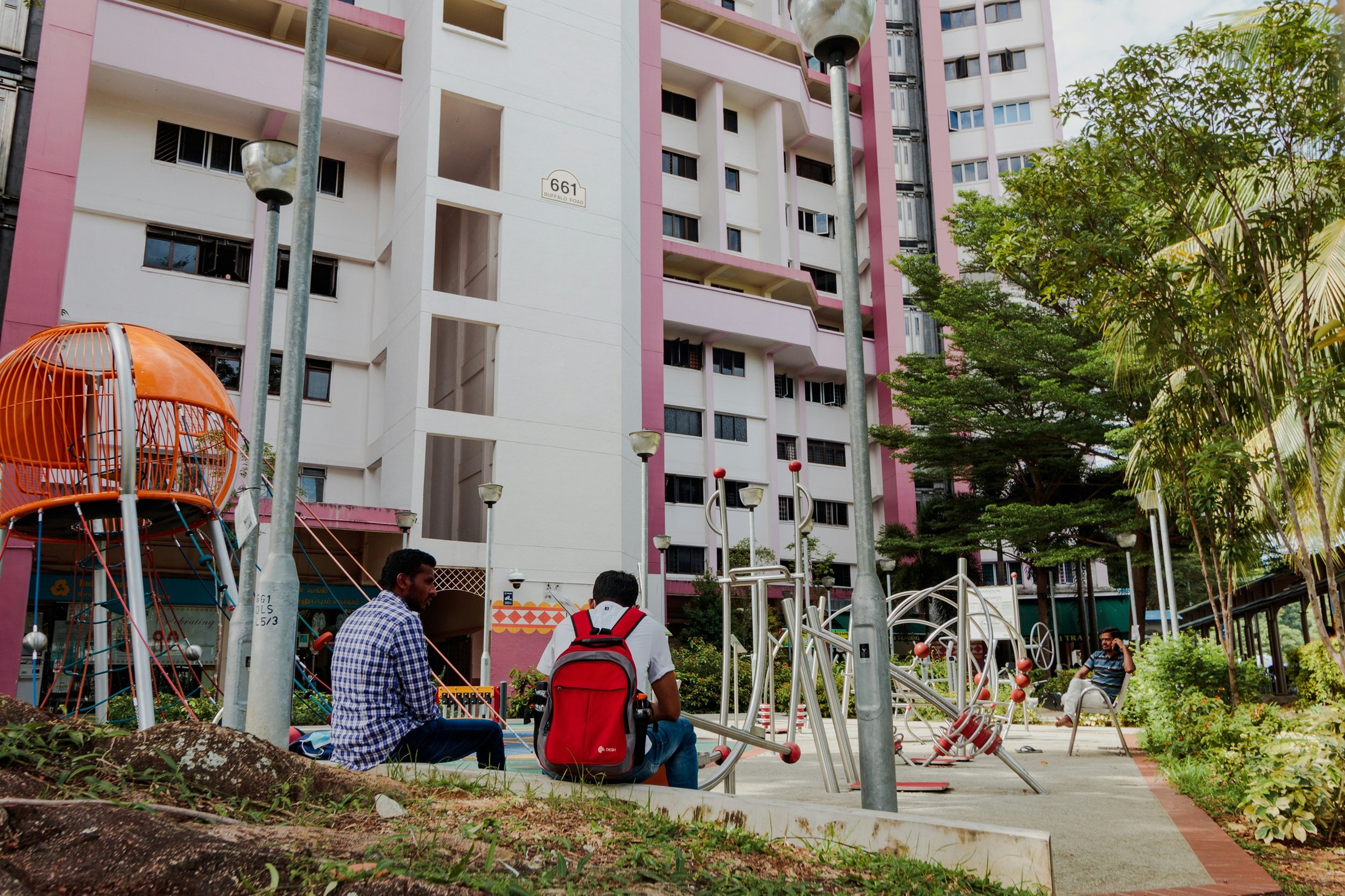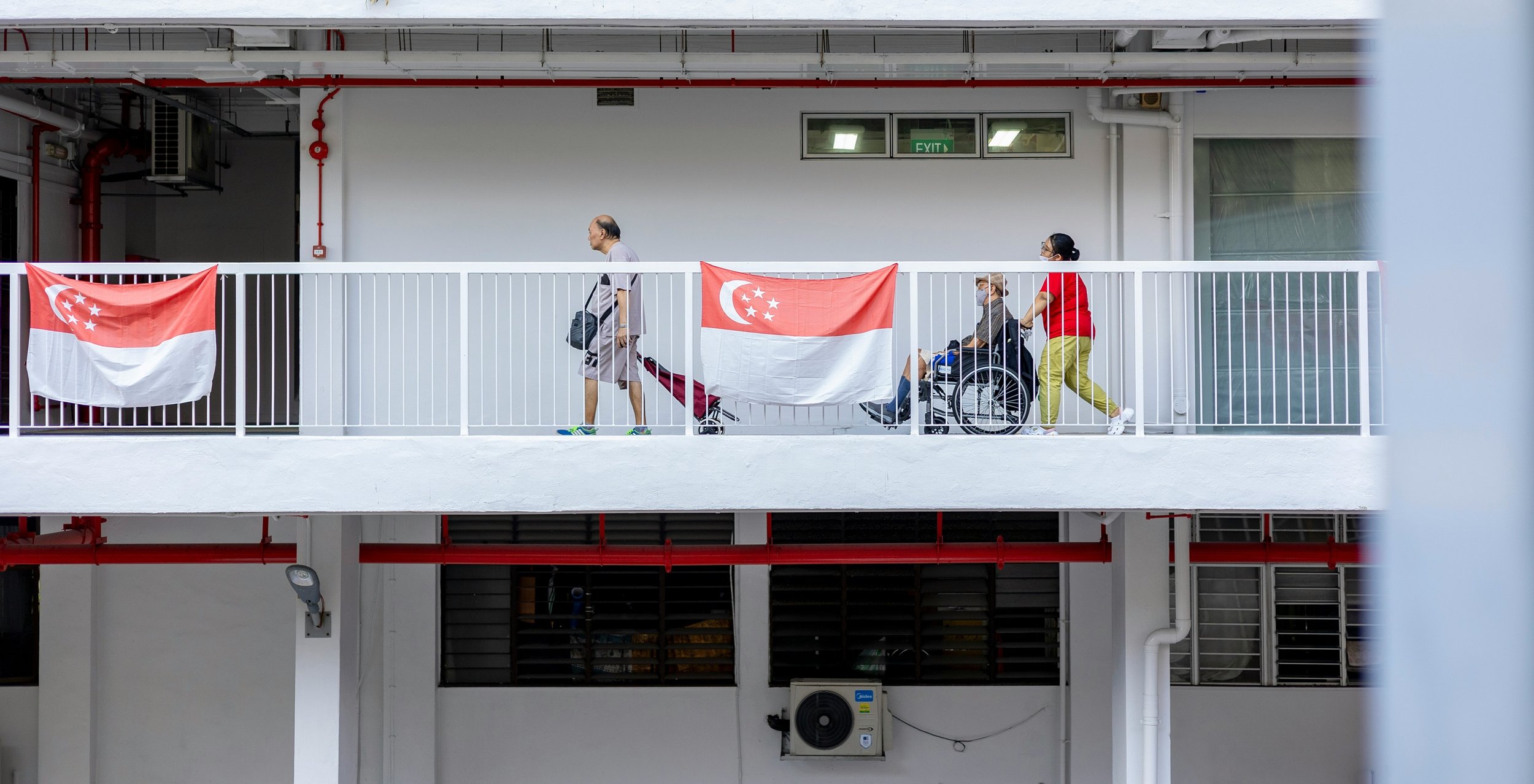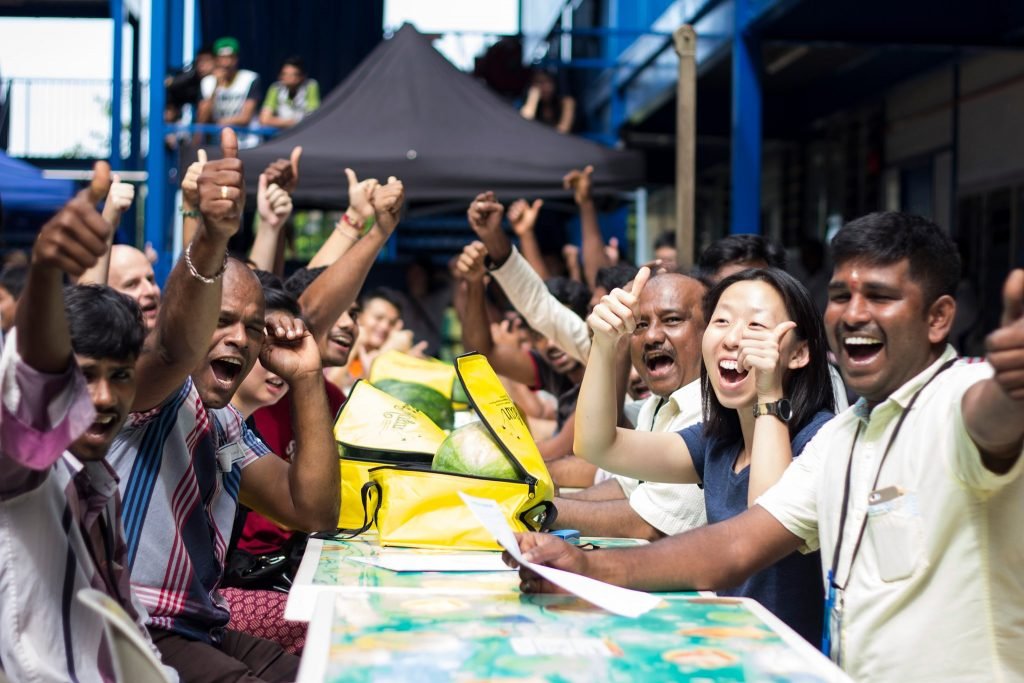Concept Paper
This concept paper describes in detail what we are trying to achieve with the Critical Illness Community Fund.
1. The Issue
Screenshot from a CNA article featuring our friend Rubel, a migrant worker who first came to Singapore in 2009
Migrant workers with critical illnesses cannot afford high treatment costs.
We are a group of friends who have helped migrant and domestic workers with non work-related critical illnesses, such as cancer, to set up crowdfunding campaigns for their treatment and living expenses. Through this work, we have witnessed the heartbreaking struggles of these low-wage workers who cannot afford the high medical costs in Singapore or back home, despite years of hard work.
While official salary data is hard to find, we estimate that the average annual wage of migrant workers in Singapore ranges from $5,400 - $9,600. In Singapore, the estimated treatment costs for late-stage cancer can range from $100,000 - $200,000 per year. Treatment costs for early-stage cancer can range from $8,645 - $43,502. Unlike Singaporeans who can enjoy subsidies for drugs and Chemotherapy, migrant workers do not have these privileges.
It is likely that they would not have built enough savings to afford treatment costs back home, given their debt burden. Anecdotal accounts suggest that treatment costs for late-stage cancer in countries like Bangladesh and India can cost up to $84,000 while treatment costs for early-stage cancer in countries like the Philippines can cost up to $15,000.
When they are unable to work, most employers often terminate their work permit and send them home to their countries with inadequate social welfare systems. There, they face crushing medical expenses and / or substantial loans owed to banks for the employment agent fees incurred when coming to Singapore.
Map showing the various Regional Medical Centres for migrant workers in the CMP sectors
While the government has launched several health-related initiatives to care for migrant workers, they are still largely unprotected and vulnerable when it comes to critical illnesses.
Migrant workers have made significant contributions to Singapore’s growth, sacrificing years away from their families to build our infrastructure and care for our children. The government has launched several initiatives to take care of migrant workers, such as:
For migrant workers in Construction Marine and Process (CMP) sectors - regional medical centres to provide quality and affordable primary medical care, improving dormitory standards, building Recreation Centres and mandating employers to purchase a primary care plan as part of their work pass requirements. [1]
For domestic workers - mandating one rest day per week, a personal accident insurance coverage of at least $60,000 per year and raising the annual claim limit of medical insurance to $60,000.
We estimate 840 migrant workers to be diagnosed with critical illnesses per year
Although data on migrant workers diagnosed with critical illnesses is unavailable, we estimate that around 350 male migrant workers and 490 female migrant workers under 49 years old contract cancer annually [2], using age-specific incidence rates for Singaporean males and females as a reference.
The Migrant Worker Centre’s (MWC) Chairman Yeo Guat Kwang has also previously highlighted unexpected heart attacks, cancer, stroke and diabetes as some of the leading causes of death among the migrant worker community in Singapore.
While their mandatory medical insurance does cover inpatient treatment for critical illness, it does have three limitations
Employers of migrant workers in the CMP industries are mandated to purchase:
Work Injury Compensation Insurance - for work-related injuries, workers covered can claim for medical expenses, medical leave wages and lump sum compensation in event of permanent disability or death. The Work Injury Compensation Act (WICA) sets the annual limits for each work-related injury, illness, permanent disability or death, ranging from S$45,000 up to S$225,000 within one year from the date of accident, whichever is reached first. [3] However, there can be significant delays with claims as insurers determine if the injury was work-related.
Medical insurance [4] - for non-work related injuries, these typically cover inpatient care and day surgery but not the outpatient costs associated with critical illnesses (e.g. chemotherapy, medicine, etc). The law requires an annual claim limit of at least $60,000 [5]
Employers of female migrant domestic workers are mandated to purchase:
Personal accident insurance - to cover sudden and unexpected incidents resulting in permanent disability or death, with a sum assured of at least $60,000 per year.
Medical insurance [6] - covers the costs of inpatient care and day surgery, with a mandatory annual claim limit of at least $60,000. Employer are responsible to co-pay 25% of claim amounts above $15,000 [7] and any amount above $60,000, even if the illness is not work-related. Almost 99% of bills for hospitalization and surgical procedures fall under $60,000 and employers receive help from medical social workers in hospitals or MOM if they face genuine financial difficulties.
However, despite this, these mandatory medical insurance have three limitations:
The minimum claim limit of $60,000 might not be sufficient to over the treatment costs of late-stage critical illnesses and it is reasonable to assume that most employers would, for cost reasons, choose the minimum required $60,000 claim limit.
The mandated requirements do not cover outpatient costs (e.g. chemotherapy, medication, etc), only inpatient expenses
It also does not cover overseas treatment costs if workers are sent home, as often is the case when they are diagnosed with a critical illness
Besides their mandatory insurance being insufficient, migrant workers also face two main challenges when accessing treatment for critical illnesses
First, many hospitals would need a Letter of Guarantee from the Employer to start treatment, therefore revealing the worker’s illness to their employer, which could lead to them being sent home. Second, workers may not be aware and / or understand their right to activate their insurance or are fearful to approach their employers.
Screenshot of an article from Asiaone
From what we can find, migrant workers have four avenues of support when they are diagnosed with critical illnesses but each is limited in their own way
Care4MigrantWorkers (C4M) for male migrant workers - launched by LEAP201 Foundation and MWC in 2020 as Singapore’s first low-cost group term life insurance for male migrant workers. For $9 per year (75 cents per month), it covers 37 critical illnesses, all causes of death and non-work accidents resulting in death or total and permanent disability, offering a lump-sum payout up to $10,000. 70,000 workers (about 15%) in the CMP industries from 64 companies signed up.
LEAP and MWC raised $600,000 to subsidise premiums for the first 50,000 migrant workers for two years, starting in 2021. [8] Since its launch, two payouts have been made to families of migrant workers who died of heart attacks. C4M has since been subsumed into MWC’s Associate Membership Program, with 150,000 workers on board.
However, this $10,000 payout falls short of the estimated treatment costs listed above and does not cover the 294,800 domestic workers in Singapore.Emergency financial assistance - male migrant workers in distress can apply for assistance under MWC’s Migrant Workers Assistance Fund. In the event of death, MWC may also provide assistance to their next-of-kin (quantum unknown). Female migrant domestic workers can apply for the Domestic Employees Welfare Fund by NTUC (through the Centre for Domestic Employees) for medical support and subsistence allowances, amongst others. However, this assistance is on a case-by-case basis and might be insufficient to cover the financial needs of workers facing critical illnesses.
Crowdfunding campaigns - launched by non-profit groups such as Migrant Mutual Aid and ItsRainingRaincoats and kind-hearted employers. However, the success of such campaigns is dependent on whether the worker has a media-worthy story or personal networks, which a majority do not have.
Kind-hearted employers who foot the bill - we have seen stories in the media of employers of domestic workers who paid over $24,000 for chemotherapy sessions in Singapore or $28,000 for breast cancer surgery in Manila. However, this could induce significant financial stress on employers.

2. Opportunity
To get unstuck, we must consider the central question: “Who pays?”
We think this is a complex problem that has remained stuck because there are multiple stakeholders with different constraints that make it difficult to answer the question: “who pays?” The following table is a hypothesis of the perspectives that these stakeholders may have:
We believe a systemic solution required to address this issue but that will take a long time. However, there are several things we can do in the interim.
Long-Term
Consider a national MediFund equivalent for migrant workers where contributions to premiums can be shared
Create customized financial products for low-wage migrant workers, with a savings component that is tied to insurance. This would be helpful in attracting low-wage migrant workers who may see insurance as an unnecessary expense.
Mid-Term
Raise limits of coverage in mandatory insurance to be closer to prevailing cost benchmarks and expand into outpatient costs
Educate workers about critical illness insurance and enroll eligible ones into the C4M scheme
Short-Term
Launch the CritiCare Fund for Migrant Workers to provide financial relief for workers, diagnosed with critical illnesses
The Forward Singapore movement presents a valuable opportunity for us to re-examine our broad societal commitment to migrant workers
There are currently 737,700 CMP and domestic workers in Singapore, making up 12% of our population. This is larger than the entire population of the West region of Singapore comprising towns like Jurong East, Clementi, Choa Chu Kang and Boon Lay.
As PM Wong and his 4G leadership team refresh our social compact through the Forward Singapore movement, how might we include a broad societal commitment to care for the critical illness needs of our migrant workers?

3. Our Idea
Create Singapore’s first crowdfunding community fund for migrant workers diagnosed with critical illnesses
As we continue advocating for systemic solutions, we propose creating Singapore’s first crowdfunding community fund for migrant workers diagnosed with critical illnesses in the interim. The fund will reduce inequalities in crowdfunding and increase the chances of any worker in need receiving assistance, regardless of their popularity or connections.
The fund will include the following components:
Community-led council that decides disbursement guidelines - funds raised can be stewarded by a diverse council comprising doctors, civil society folks, employers, migrant workers, etc, ensuring decisions are made by people with deep insight into the lives of migrant workers. This approach is similar to what the Mind The Gap Collective did in 2020 for low-income families in Singapore.
Coalition building to advance systemic change - this collective can serve as a platform for council members to advocate for systemic change. For example, by collectively engaging the media to share human stories of migrant workers with critical illnesses, the coalition can raise awareness about the gaps in insurance coverage and push for better policies.
Collection of data on incidence of critical illnesses in migrant workers - which would aid future insurance products, community programming and policy planning efforts by private, public and social sector organisations.
Good governance - administered by Ray of Hope, an Institution of a Public Character (IPC) known for their expertise in setting up crowdfunding campaigns and adhering to governance standards. This ensures transparency and accountability, while also offering tax deductions to donors, encouraging more generous contributions.
Open to application all-year round - migrant workers can apply for the fund all-year round. We will organise fundraising drives when funds start running low.
This community fund could create a new social compact between Singaporeans and migrant workers
This community fund could relieve the burden that currently rests on kind-hearted employers, resourceful civil society actors or hospitals who sometimes write off medical bills of migrant workers with critical illnesses.
Most importantly, it gives us an opportunity to create a new social compact with these workers who sacrificed their youth and time with their families to build our country; one that ensures a viable, consistent tranche of funds that they can tap on in the event of a critical illness, as we await more systemic solutions like insurance and policies to catch up.

4. Fundraising Request
We are seeking initial donations of $410,500 from relevant Foundations, Family Offices and individuals to kickstart the Fund.
This would enable us to support at least 20 migrant workers over two years and cover the costs of a Secretariat team to assess, evaluate and prepare the relevant documents for the council’s consideration.
From our past conversations with MWC and non-profit groups supporting migrant workers, we estimate to receive around 10 cases per year. Over time, we will be better able to gauge the demand for such funds and make better predictions for future fundraising target amounts.
-
Assume each case would require approximately $20,000 to cover some of the following costs, as decided by community-led council:
Costs of treatment, such as: hospitalisation costs, chemotherapy, medication, dialysis, radiotherapy, positron emission tomography (PET) scans, hysterectomy, etc
Replacement income to provide living expenses for the worker during the period of treatment or in the event of death, to cover living expenses of their family for a period of time to be determined
Transport costs to and from the hospital where treatment is sought
Miscellaneous costs, which may include: other relevant doctor’s fees, rent, clothing or purchase of supplies to start a small business
-
Key assumptions:
It takes 8 hours for a member of the Secretariat team to assess, evaluate and prepare the relevant documents for the council’s consideration
The Secretariat team will assess a total of 30 cases over two years
Each man hour is valued at $40
-
This could include:
Token of appreciation for council members
Venue and other costs for launch event

5. Terms of Reference
Responsibilities for Council Members
Meet once a month for up to two hours to review cases proposed by the Secretariat, providing insights from their experiences that can guide the final funding quantum disbursed to beneficiaries
Where convenient, refer migrant workers afflicted with critical illnesses to the Secretariat for needs assessment
Help to amplify fundraising efforts for the Community Fund, such as providing referrals to Foundations and Family Offices or helping to share public fundraising campaigns with their personal networks
Responsibilities for Secretariat Team
Receive applications from migrant workers afflicted with critical illnesses and conduct needs assessment interviews to determine their suitability for the Community Fund and propose a funding quantum for the consideration of the Council
Liaise with the affected migrant worker to consolidate necessary documentation (e.g. diagnosis letter, hospital bills, etc) required to support their application for the Community Fund
Follow-up with workers after they have received funding to keep updated on their medical status and provide updates to donors
Update social media accounts and the Community Fund’s website with information on fund beneficiaries

6. Timeline
October 2024
Send Invitations to Proposed Council Members
First Meeting of Council Members
Identification of potential donors to the fund
Begin Outreach to Potential Donors
Send Invitation to Guest of Honor for Launch Event
Nov 2024
Engage in Conversations with Potential Donors
Launch Fundraising Campaign on Ray of Hope’s Website
Implement Social Media Marketing and Media Engagement Strategy
Second Meeting of Council Members
Finalise fund disbursement guidelines
Secure Panellists for Launch Event
Secure Verbal Commitment from One Donor
Dec 2024
Launch Event for CritiCare Fund for Migrant Workers
Receive First Batch of Applicants for the Fund
Jan 2025 Onwards
Monthly Meetings of Council Members to Review Cases Received and Determine Final Funding Amount

Footnotes
[1] Mostly for male migrant workers who work in the CMP sectors[2] Rate calculated using an average of age-incidence rates below 49 years old of males and females mentioned in Singapore Cancer Registry Annual Report 2021 and multiplying that by the number of MDWs and CMP work permit holders as per MOM Data[3] According to MOM, migrant domestic workers are not covered under WICA. Instead, employers are required to buy personal accident insurance to provide them with compensation in the event of death or total permanent disability during their work here[4] MOM does not track the number of non-work related injuries because they are not covered by WICA
[5] Although for policies with start date effective before 1 July 2023, the claim limit is $15,000 per year. For claim amounts above $15,000, there is a co-payment of 75% by insurers and 25% by employers
[6] We did find anecdotal evidence of an insurance plan providing $1,000 coverage for outpatient cancer treatment
[7] For example, if a domestic worker incurs a $60,000 bill for heart surgery, the employer will pay $11,250 (25% of $45,000 - the amount above $15,000) and the insurer will cover the other $48,750)
[8] With the subsidy, employers of migrant workers will only have to pay $3 per year (for the first two years) for each migrant worker insured. The 37 critical illnesses include major cancer, stroke with permanent neurological deficit and heart attack of specified severity




